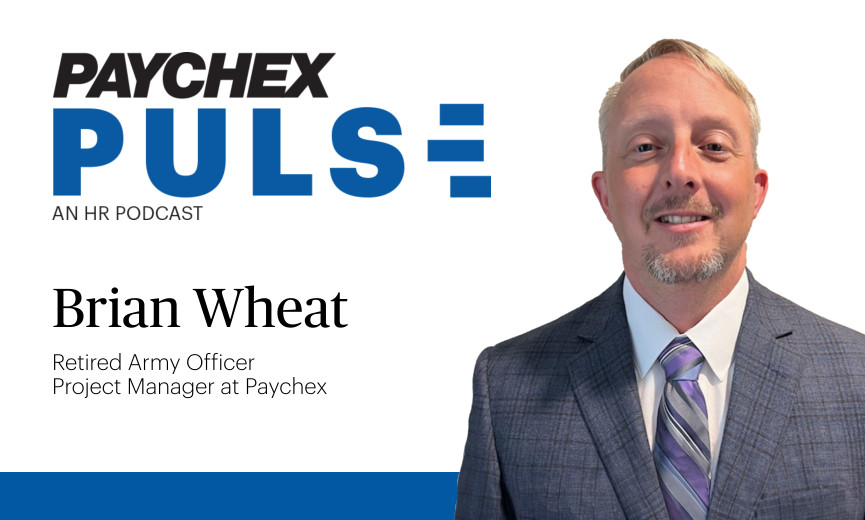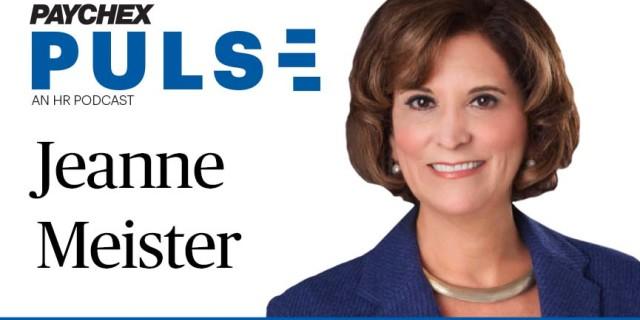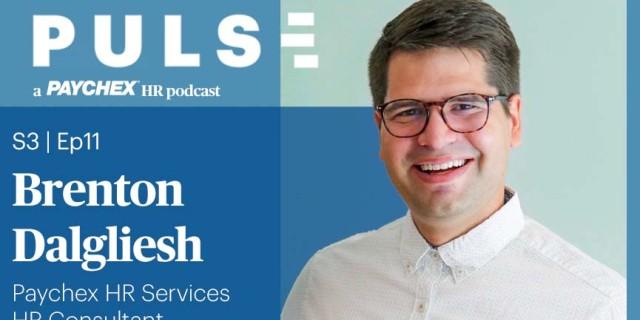De usar camuflaje a usar corbata: el enfoque estratégico para la contratación de veteranos

Podcast •

Vea
Resumen
In this episode of Paychex PULSE, and HR Podcast, retired Army officer Brian Wheat shares his journey transitioning from the military to civilian life, offering insights for HR professionals seeking to recruit veterans. From challenges in resume writing to the importance of mentorship and networking, Brian sheds light on the unique experiences veterans face. Listen now and gain a deeper understanding of the veteran job-seeking experience and discover strategies for fostering a supportive work environment.
Los temas incluyen:
00:00 – Welcome Brian Wheat
01:41 – The challenges of transitioning to civilian life
04:11 – The successes of transitioning to civilian life
06:04 – Translating military career successes for hiring managers
08:44 – How to best onboard veteran hires
11:35 – Misconceptions when hiring veterans
15:06 – The soft skills veterans bring to organizations
17:45 – Brian’s advice for employers when hiring veterans
20:30 – Wrap Up
Connect with Brian:
> LinkedIn
If you are considering hiring military veterans, here are helpful tips that will help make the recruiting and hiring experience more positive.
Tommy Stuckey, a U.S. Marine veteran and former restaurant manager, used his life savings to launch his first quick-serve restaurant. Hear how Paychex helped him streamline and simplify his operations.
Successful onboarding is about efficiency and making a good first impression, and Paychex has the technology and support you need to make that happen.
Ver transcripción
Brian Wheat (00:00)
Collaboration, adaptability, those skills, the leadership skill of, because when you go into leadership roles in the military, you really have to question, how do I want to lead? What type of leader do I want to be?
Rob Parsons (00:19)
Welcome to season four of Paychex PULSE, an HR Podcast, where HR professionals can find great insights on today's top issues and be inspired to build and lead effective teams in a healthier workplace. Hi, everyone, Rob Parsons here. Welcome to the Paychex PULSE podcast. We have a special guest today in honor of Veterans Day. Please welcome Brian Wheat. Brian is a retired army officer with 20 years of experience in various high-risk, high-visibility security and leadership roles. He also has his Ph.D. in leadership and policy from Niagara University. He was hired at Paychex in June of 2022 as part of the Client and Service Readiness Team with a focus on security, infrastructure, and business continuity planning. Brian, welcome to the podcast.
Brian Wheat (01:15)
Thanks, appreciate it.
Rob Parsons (01:17)
It's great to have you and I really sincerely want to start by thanking you for your service. You've certainly had a long and illustrious military career, just putting in the full 20 years.
Brian Wheat (01:30)
Yeah, it was an exciting 20 years. The first 10 seemed to go really slow, and then the last 10 went really fast.
Rob Parsons (01:40)
I could just imagine. So, when 20 years came, make that decision to retire, move on to a civilian life, what were your biggest successes and challenges in that journey before you landed here at Paychex? I got to think, the reason I'm asking this is because I got to think your path isn't totally unique and business and HR leaders can learn from your experiences when they're going out and trying to recruit veterans for their workforces.
Brian Wheat (02:11)
Yeah, I mean, some of it might be unique, but majority of it's probably the same for a lot of the individuals that are getting out of the military. But some of the challenges that I ran into really was the resume writing. Everybody has their opinion on what it is that should be in your resume or shouldn't be in your resume, and how you should state things. Just trying to listen to everybody and put in there what everybody is saying, it just, it doesn't work. That was one of my biggest challenges is figuring out what I actually needed to have in there that sold my expertise, and it took a little while to figure that out. And then, I guess time management was another thing. For me, being a field grade officer and getting ready to get out, I had the luxury to have a little bit more free time than what maybe, say, a junior enlisted soldier would have or an NCO may have. Because at the end of the day, we're still in the military, so they expect you to do your job until the day that you're not doing your job anymore. So, time management was difficult to come by, especially in my role, because I was a contingency planner for the 101st Airborne Division. So, a lot of work, there, and they tried to work me until the last day. That was definitely a challenge, but I made it through just because of my planning. And then, I guess, in the process itself of job hunting, it was the establishment of meaningful connections, trying to find those right-fit opportunities and talking to the right people in the organizations just to see if I would be a good fit and whether I'd fit into the culture or not. Some of those were challenges. Some of the successes that I had, though, was I had my transition planning. With all my years of planning experience, it was easy for me to write down a timeline, figure out where I needed to put things, how I needed to schedule my interviews or schedule actual time to write my resume or whatever. I also undertook a mentorship program, which I think was a huge success. I dealt with somebody who was in corporate America. He was an operations manager. He helped me through the process. We talked about what's the ins and the outs of business and how I could fit properly into the organizations when I applied. He really helped out a great deal, great guy. And it was just that mentorship. If I could recommend that to anybody else that's transitioning out, I think that that was a big help. He also helped me with my resume. He reviewed it a couple of different times. Just, "Hey, this is what corporate America is looking for. Here you go, here's some key points, I think." And then, one of the other things that they stress to you, and I think a lot of people probably take it as a grain of salt, maybe. But the professional networking, reaching out to those who had just retired before you who have went through the process, and then trying to find some of those that are in corporate America that are retired military. Reach out to them. Get some insights into the companies that you're trying to hire into. That was a success that I also used. It didn't work out like that for Paychex, but it did work out like that for a couple of the other organizations that I interviewed with. So, that was definitely a strength as well.
Rob Parsons (06:04)
That's really interesting since some of those elements are so common to those of us in the civilian life as well. I did want to touch on something one of our writers wrote. Mark Dovi put together a great article on hiring veterans. And he noted, "It's not that the skills that you had didn't translate, but rather, the skills were lost in the translation." Was that your experience? And I'm thinking is that, as you were working on that resume and trying to put together the story of Brian Wheat, the professional, and how that worked out and how you finally got over that hump. What was your experience there with trying to translate from military to civilian?
Brian Wheat (06:50)
It was exactly that. I mean, it wasn't that it was, it was lost in translation, it really was. As mentioned in my resume writing, like you just said, everyone has their opinion when it comes to your resume, how this should be stated, how that should be stated. And then, when I finally learned I needed to reach out to the organization and see what that job posting was and see what some of those top skills and top other things that they were looking for that fit their culture. Once I figured that piece out, it helped to identify, okay, this is how I need to state this experience that I have, and making sure that I had some of that wording from that job posting in my actual writeup for my bullets in my resume. I'll give you an example for Paychex or any other organization that's doing business continuity planning. Business continuity planning has its own set of terms and conditions and things of that nature. For me, I was a contingency planner in the military. It all translates the same. I'm doing contingency planning; I'm doing continuity planning in the civilian sector. But the way that I kept writing it up was I was contingency planning. So, there, it might be lost in translation that really, what I was doing was business continuity planning and I just didn't write it up the right way. It took me a little while to figure that one out, but once I did, that's when I started getting more interviews.
Rob Parsons (08:26)
I could see that as, as you may or may not be aware, there's so much automation and AI when it comes to even screening the resumes for the right words to even get through to be able to talk to somebody. So, I could see that being a real challenge. I want to go back to something else you mentioned about, you've said a couple times looking at culture. And I got to think getting hired is just the beginning for a company to, I guess what I'm getting at is, are there thoughts around onboarding, around training, around things people should be doing to bring veterans into the organization to avoid culture shock or to maximize their impact or just help get the most out of that fit as quickly as possible?
Brian Wheat (09:17)
I think talking openly in the interview process to the veteran candidate about the company culture, what would be expected of me coming into the organization? That was one thing that was huge that Paychex actually did when I was doing the interview process. They took the time to talk to me about the culture fit, what was I looking for? Because honestly, a lot of us transitioning out have that, I don't know what I want to do next. I really don't know what fits me, what doesn't fit me. So, they go through that process in their mind and talking with other individuals. I think talking openly about that stuff up-front in the process will help identify, am I going to be a good fit in this organization or not? Just, again, lay out the expectations of what it is that you want this new hire to do. Provide a timeline, provide structure. What is it going to look like for me in the next three months, six months, a year? Am I going to be able to advance? What's that look like? Do I even want to advance? I don't know. Those are just things that cross your mind in the process. And that was one thing that, coming out of the military, I worked hard for 20 years. And so, coming into corporate America, it's, how hard do I really want to work? Now, I've got this retirement I can fall back on if I really want to. I don't have to work, but I want to, and I want to make sure that I have that right culture fit and I'm making a contribution to the organization. That structure is really key and that was something, again, that Paychex really did well when I onboarded. Find out, talking with them, what motivates them. Because motivation for the retirees as opposed to somebody who's only done five years in the military and is trying to get into corporate America, the motivations could be different for each of those individuals. So, just talk to them openly, get to know them a bit, and then go from there. I think that will help with the culture shock.
Rob Parsons (11:33)
I love it, that's great advice. That just, in my mind, the military life is all about structure. And maybe I have a misconception, there. I mean, we all have an idea of it, not having been in it. Are there other misconceptions that I and other HR professionals may have about military veterans that you've seen or have seen others that you've known run up against?
Brian Wheat (12:01)
Yeah, I think one of them that I actually, myself and a couple people that I know firsthand. When we were putting it in your resume, again, that lost-in-translation thing could translate to a lack of experience. I had, "This person has a lack of experience in this area." Well, it's not that I have the lack of experience, it's possibly, I just didn't know how to state it in my resume, so you miss that. That could be a misconception of hiring. Does this individual have the ability to conform to our business norms in this organization? That could be another misconception. They might be looking at this individual as, this person is too black-and-white, and they're not going to be able to get into this organization and fit well. That's one of the things that a military person coming into an organization is actually going to bring to the organization. We have the ability to adapt quickly. I mean, that's just the nature of what it is that we do in the military. If we need to adapt to the environment that we're in when it comes to civilians in corporate America, we can do that. It may take us a little bit of time, but we have the ability and we can do that, especially if our heart's in the right place. I guess, and also looking at the resume, job-hopping could be considered another misconception that they have. In the military, it's pretty well known, you have a cut path, like you said, a structure. And it's, you do this, A, B, and C, and you're going to see your next promotion, you're going to see the next opportunity. And that could be in the next six months. That could be in the next year. That could be in the next two years. In corporate America, that's seen kind of as like job-hopping. You're switching jobs all these times. Well, no, I'm advancing. I'm doing well in my organization. They want to promote me, and you move. And that's just the nature of the beast in the military. So, when you put that into your resume and you're putting in your qualifications, and if you don't put it in there as, "I've had five years of military experience. Here's the stuff that I did," and you've listed it as five years of service. And you put it in there as six months. "This timeframe to this timeframe, I had this role. From this timeframe to this timeframe, I had this role." It looks like you're job-hopping to a civilian person looking at the resume, when really, you're still in the same organization, you're just moving up. That was something that I realized pretty quickly. And so, I tried to tailor my resume a little differently, and it paid off. I started getting, again, more interviews and stuff when I finally did that.
Rob Parsons (15:04)
Rob Parsons (15:04)
That makes sense. Brian, I loved what you were talking about about adaptability, which leads me to think, we've been talking a lot about your hard skills. But there's got to be a lot of soft skills that somebody, a military veteran, is going to bring to the table. Things like initiative, the ability to see a task through, the ability to lead, depending on what your career was like. Can you just touch on some of the skills you learned in the military that really translated well into your role at Paychex? And not the hard skills, but those soft skills that just make you a great person to work with?
Brian Wheat (15:45)
Yeah, I mean, you just hit pretty much all of them. Collaboration, adaptability, those skills. The leadership skill of, because when you go into leadership roles in the military, you really have to question, how do I want to lead? What type of leader do I want to be? And if you don't, you have the possibility to fail. So, just those types of skills when you're moving into corporate America and you have to deal with it all the time in the military, it makes it so you're more comfortable, honestly, to step into corporate America and take on leadership roles. Because you start off, when I was a specialist, I was in charge of three. And then my squad leader went down, and so, I was in charge of 13. And that was my first year in the military, so I'm already in charge of people. And then, as I moved up through the ranks, I was a platoon leader, I was in charge of 42. I was a company commander, I had over 100. And it's just the way that you go up through the ranks, the more responsibility you have, that those soft skills really come into play, especially when you're handling different missions and things of that nature. Just being able to be approachable as a leader and take into consideration even what a lower enlisted individual might bring to the table. Everybody has their strengths, so you just have to, it's one of those things you need to realize, what is this person's strengths, and then put it to use.
Rob Parsons (17:24)
Love it, so interesting. And certainly, a skillset that is not as well purposefully developed in corporate America. I think a lot of times, you just end up in a leadership role without that support and expectation and training that you need to actually do it well. Any last thoughts for our listeners as we come up against time, here?
Brian Wheat (17:51)
Veterans often face disadvantages when job searching because they often lack experience in dealing with corporate professionalism. They may not know how to draft that resume, like we had spoke about, for private industry. They may not know that job-hopping is frowned upon when they're doing their job search and how to tailor that resume accordingly. I guess, don't underestimate the veteran candidate. Being in the military makes you extremely adaptable and agile. It's the nature of who we are and what we do. It's just the nature of the beast, I guess. It also teaches you incredible loyalty, problem-solving skill, communication skill, various specialty fields from which civilian businesses could benefit. And also, challenge employers to shed their biases around what it means to be a veteran. It's no secret that soldiers get stereotyped as having more serious mental health or substance abuse issues than civilians do, and that may make employers hesitant to hire them despite the ADA requirements that we have. But I would urge recruiters and managers to make a conscious effort to set those misconceptions aside and assess the veterans on their skills and experience as they would any other candidate. And then lastly, during the negotiations phase for the salary and benefits, be up-front with the veteran candidate. The only information accessible to those of us transitioning is what's posted out there online, and that is not always accurate, especially for where you are in the United States or worldly. Salary and benefits for retirees such as myself may not be as important as what culture fit was. For a junior officer or a junior soldier not having that time in service, not being able to fall back on that retirement, especially if their income is the only income for the family. Because a lot of the time, due to the constant moves, spouses have a hard time getting work and being employed. Or again, on their side, it shows that they are job-hopping, whereas they're not trying to do that. So, take all that into consideration when you're looking at a veteran candidate. And I think at the end of the day, what you'll see is a success in your organization if you onboard them correctly.
Rob Parsons (20:30)
Brian, thank you for joining the podcast today. It was really great having you. And thank you to our listeners. Happy Veterans Day, and as always, please stay happy and healthy. Be sure to subscribe to this and our "Paychex Thrive" business podcast on your favorite podcast platform. Looking for more ways to keep your finger on the pulse of industry dynamics? Visit our resource center for the latest research, thought leadership, and news at paychex.com/worx, that's W-O-R-X. Thanks again for joining us. 'Til next time, please stay happy and healthy.
Announcer (21:09)
This podcast is property of Paychex Incorporated, 2023. All rights reserved.

 Apple Podcast
Apple Podcast Spotify
Spotify iHeartRadio
iHeartRadio









